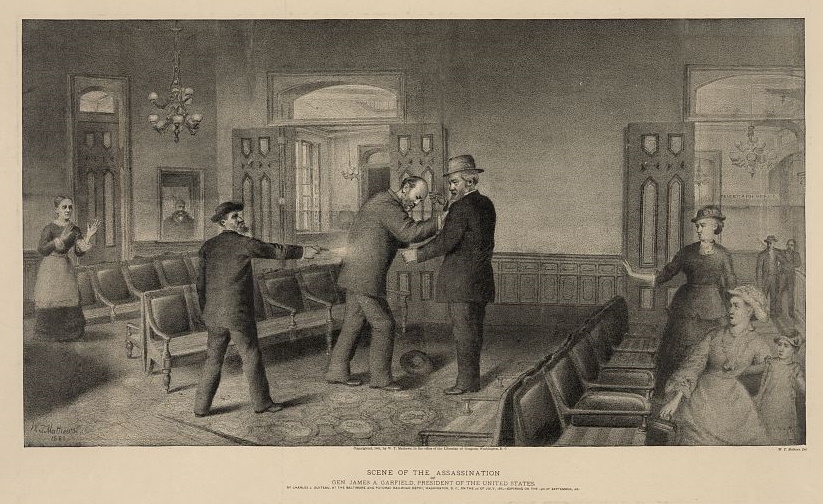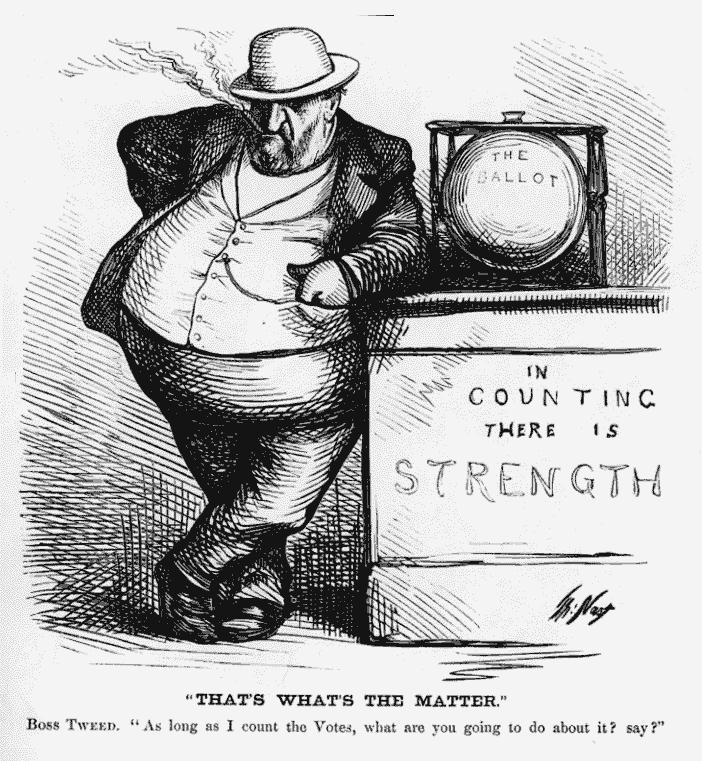
JUMP TO

TRANSLATE

OTHER VERSIONS OF THIS READING
INTRODUCTION
The Gilded Age was a time when a very few people had most of America’s money. This inequality has happened many times in America’s history, including today. Money is often seen as a sign of success and the industrialists were both looked up to and sometimes hated for their richness. But they were respected for the power that money could buy them.
Politicians in the Gilded Age knew the power of money. Many of them took money from business owners in exchange for favors. This is bribery and it was common. Another kind of cheating, fraud, was common in city government.
Even though the great monopolies are now gone, there are still politicians who take bribes for favors. Things today are far better than in the days of the Gilded Age. So, money did not always win out.
What do you think? Does money make you powerful?
THE FORGETTABLE PRESIDENTS
The Gilded Age is usually remembered for the amazing things that were done by thousands of American thinkers, inventors, entrepreneurs, and writers. There were not very many important politicians at the end of the 1800s. After the Civil War, Presidents were not that powerful, and the Congress was known for corruption. State and city leaders shared in the cheating, and the public mostly didn’t know how bad things were. Much like in the colonial days, Americans were not taking their orders from the top; rather, they were building the country up from the bottom
The American Presidents after the Civil War are sometimes called the Forgettable Presidents. Looking at each one helps us understand why.
Andrew Johnson was so hated he was impeached and would have been removed from office were it not for a single Senate vote.
Ulysses S. Grant was a war hero but was not a good politician. He did not get elected for any job before the Presidency and did not know how to get things done in the government. He needed help from people who had worked in government for a long time, but many of these people were stealing government money. For example, his secretary of war sold Native American land and kept the money for himself. His private secretary worked with people in the Treasury Department to steal money raised from the tax on alcohol.
These people in his team were put on trial for selling government land. The newspapers called it the Credit Mobilier Scandal. Grant was not a part of these scandals, but he did not have the skill to control his staff or replace them.
Rutherford B. Hayes took over after Grant. Hayes was honest, but his Presidency was weak because of how he had been elected. This was still soon after the Civil War and there was a fight in the southern states about who would get to vote, and some states sent two separate sets of election results. In the end, Hayes won, but many people thought he really should have lost.
James Garfield took over after Hayes, but after only four months, Garfield was shot by Charles Guiteau. Guiteau was upset with Garfield for not giving him a job in the government. Secondary Source: Lithograph
Secondary Source: Lithograph
An artists’ rendition of the assassination of President Garfield by Charles Guiteau.
Vice-President Chester Arthur was next. After Garfield had been murdered, Arthur started to think that the way government jobs were given out was bad. He signed the Pendleton Civil Service Act, which made it so many government jobs were not given out by politicians to their supporters but were given to people who could pass a test instead. Even though this turned out to be a good change that made government work better, the Republican Party did not choose Arthur to run for election on his own in 1884.
One President impeached, one President surrounded by corruption, one President picked by possibly cheating, one President assassinated, and one disgraced by his own party for doing what he thought was right. It was not a good time to be president!
POLITICAL CORRUPTION
This was a time when Congress was taking the lead, not the President. However, Congress was full of people who had been paid off by big business. Big business owners gave the politicians so much money that the elected leaders listened to their business supporters instead of the voters.
City governments were controlled by political machines. Small groups of politicians got power and used the public tax money to stay in power and grow rich.
Becoming mayor of a big city in the Gilded Age was like walking into a tornado of requests for better sewers, cleaner water, new bridges, better subways and roads, better schools, and better help for the sick.
But to solve the city’s problems, the government had only limited money and people. Democracy did not do well in this situation. To bring order, political bosses took on people who would help them stay in power. The people and the organizations the bosses ruled over were called the political machine.
Politics can be simple and difficult at the same time. In order to keep power, a boss has to keep his constituents or voters happy. Most political bosses turned to the newest, most needy people of the growing cities, the immigrants. Sometimes bosses would open relief kitchens to get votes. Bosses would give leaders of local neighborhoods city jobs in order to gain loyalty from the people of that neighborhood.
Bosses knew they also had to make the leaders of big businesses happy also, and so they gave them money by making deals for the building of factories or public works. These industries would then spend a lot of money to keep the political machine in power. It sounds simple: “You scratch my back and I’ll scratch yours.” However, bringing mixed interests together in a city as large as New York, Philadelphia, or Chicago needs hours of work and great political skills.
All these activities were at least partly legal. The problem was that many political machines broke their own laws whenever they wanted. As deals were awarded to legal business, they were also awarded to illegal gambling and prostitution rings. Money from these illegal businesses went into the pockets of city officials. Public tax money and bribes from the business also went to these dishonest leaders.
Voter fraud was common. Political bosses arranged to have voter lists filled out with many fake names. In one district, a four-year-old child voted. In another, a dog’s name showed on the list of voters. Members of the machine would “vote early and often.” That is, they would place illegal votes by traveling from one polling place to another. One district in New York once reported more votes than people.
The most famous political boss of the Gilded Age was William “Boss” Tweed of New York’s Tammany Hall. For 12 years, Tweed ruled New York. He gave money to the poor and handed out Christmas turkeys and winter coal to supporters. Along the way, he stole millions of dollars in tax money, which went into the pockets of Tweed and his partners.
People started to notice Tweed’s crime because of political cartoonist Thomas Nast. Nast’s pictures were important because many New Yorkers couldn’t read well but could understand how Tweed was cheating them because of Nast’s drawings. A zealous lawyer named Samuel Tilden put Tweed on trial and his rule came to an end in 1876. Amazingly, Tweed escaped from prison and traveled to Spain, where he was spotted by someone who remembered his face from Nast’s cartoons. He died in prison in 1878.
It was many years before new laws were passed to put an end to the corruption in city government that was common in the Gilded Age. Primary Source: Editorial Cartoon
Primary Source: Editorial Cartoon
In this cartoon, Boss Tweed is depicted guarding the ballot box. This is critical of the role he and political machines played in manipulating elections to their advantage.
THE GOSPEL OF WEALTH
Based on these examples of cheating in business and government, it would look like men with money and power during the Gilded Age only wanted to make themselves rich. However, this was not always true. As you already learned, many of the great industrialists of the time gave away a lot of money. Andrew Carnegie, who was a leader in the steel industry, is remembered for promoting this idea.
Carnegie wrote down his ideas in 1889. Today we call his ideas The Gospel of Wealth. Carnegie said that the best way of solving the problem of money imbalance was for the rich to give away their extra money in a wise way that would help all people. Normally, rich families gave their money to the children. Carnegie did not like this idea. He said that children should work for their own money.
In The Gospel of Wealth, Carnegie said that hard work and determination would make someone rich. He said rich people should live in a way that did not show off their money. Carnegie said that extra money is put to best use when it is used carefully by the rich. Primary Source: Editorial Cartoon
Primary Source: Editorial Cartoon
In this cartoon, Carnegie is seen giving away his fortune to build libraries. It reflects the positive view of the industrialists as generous philanthropists.
Carnegie tried to lead by example. He gave away his own money to build libraries. Some 2,509 libraries were built around the world with his money. In many towns, the main library is still known as the Carnegie Library. Carnegie-Mellon University and Carnegie Hall in New York City were also built with his money.
CONCLUSION
The effect of money in politics is not a story that is restricted to just the Gilded Age. Of course, people with money can do things the poor cannot, and one of these things is the ability to use money to affect others.
Sometimes, business owners gave money to politicians in exchange for favors. Sometimes they used money to buy votes and became politicians themselves. In cities, politicians formed political machines and used their control over tax money to make themselves rich and get reelected.
At the same time, however, men like Andrew Carnegie used some of their money to help people by giving it away for good purposes. This is called philanthropy.
As you will learn in later readings, the corruption that was common in the Gilded Age ended when voters worked together to pass new laws. Instead of a few individuals with access to money, everyday people worked together to show their own power. Some would say that we are again in a time when the 1%, the few super-rich, are again making decisions and influencing politics.
Based on what you know of the Gilded Age, what do you think? Does money make you powerful?
CONTINUE READING

SUMMARY
BIG IDEA: The late 1800s was a time of both enormous political corruption and the beginning of corporate philanthropy.
The years after the Civil War saw a series of forgettable presidents who did not have much power relative to Congress. One thing government dealt with was corruption. The Pendleton Civil Service Act made many government jobs open to candidates based on competitive exams. This helped limit the spoils system of giving jobs as rewards for supporting political candidates.
This period was also a time of corruption in city governments. Big city mayors used their power to give jobs and contracts to friends. In exchange they bought votes, stayed in power, took bribes, and became rich. These political machines were common. The most famous was nicknamed Tammany Hall in New York.
Money was not always as source of corruption and evil. Andrew Carnegie’s essay the Gospel of Wealth encouraged the wealthy to use their money to benefit humanity.

VOCABULARY

KEY CONCEPTS
Mayor: The elected chief executive of a city.
Political Machine: A system set up in cities in which elected leaders buy or manipulate votes. They accepted bribes and stole government money. In exchange, they lavished favors on friends who protected and supported them. The most famous was Tammany Hall in New York City.
Boss: Leader of a political machine. The most famous was William Tweed of Tammany Hall in New York City.
Bribe: Money paid to a government official in exchange for a favor. For example, business leaders paid members of congress to pass or not pass certain legislation. Andrew
Voter Fraud: Any method of manipulating elections including, voting multiple times, voting in someone else’s name, or purposefully not counting some votes.
The Gospel of Wealth: Article by Carnegie. In it he argued that making money was noble but that wealthy people should give away their fortunes to the benefit of mankind.
Carnegie Library: Name for libraries built with Andrew Carnegie’s financial support. Some are still officially called by this name, such as in Pittsburg, Pennsylvania.
![]()
PEOPLE AND GROUPS
Ulysses S. Grant: General and hero of the Civil War who became president. Although honest, he was a poor politician. His administration was weakened by the Crédit Mobilier Scandal.
Rutherford B. Hayes: Republican President elected in 1877 as part of a compromise that ended Reconstruction in the South. His influence was weakened by the circumstances of his election.
James Garfield: Republican president who was assassinated by Charles Guiteau, who was angry that he had not received a government job.
Chester Arthur: Vice-president who ascended to the presidency when James Garfield was assassinated. He signed the Pendleton Civil Service Act which limited the spoils system.
William “Boss” Tweed: Famous boss of the Tammany Hall political machine.
Tammany Hall: Nickname for Boss Tweed’s political machine in New York City.
Thomas Nast: Cartoonist whose drawings criticized Boss Tweed and the Tammany Hall political machine.

LAWS
Pendleton Civil Service Act: 1883 law limiting the spoils system by requiring that many government employees pass an exam. This helped establish a group of professional government employees outside the influence of politics. It was passed after the assassination of President Garfield by a disgruntled job seeker.
![]()
EVENTS
Crédit Mobilier Scandal: Political scandal during Grant’s presidency. His aids enriched themselves with the sale of public land.


